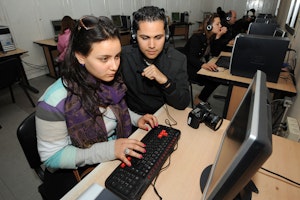In Tunisia, 62,000 Voices Call Out for Justice
By Salwa El Gantri

“I hesitated a lot before giving this testimony. But after much debate, I decided that history is not to be written in the palaces.” These were the opening words of Bechir Laabidi’s testimony at the second public hearing organized by Tunisia’s Truth and Dignity Commission (TDC). Laabidi, a miner and trade unionist, talked about the torture he and his son endured when detained by security forces during President Ben Ali’s regime.
His was one of many testimonies broadcast live to the nation. For the first time in the country’s history, Tunisians listened to stories of decades of abuse and oppression from the victims themselves.
Uncovering the truth about past human rights violations has been one of the main demands of Tunisian victims, their families, human rights activists, and diverse sectors of society, who see it as the only way to heal the wounds of the country’s dark past. Many Tunisians want answers about what happened, to whom, by whom, and why.
After the 2011 revolution, Tunisia began to grapple with the decades of human rights abuses committed by the state and organized groups during the dictatorship period between 1955 to 2013. The goal of the TDC is to reveal the truth about these abuses, provide reparations to victims, and hold perpetrators accountable.
Not unlike other transitional justice processes around the world, the Tunisian process has suffered from polarization and periods of upheaval and uncertainty. The shift in political power, the tragic terrorist attacks, and the degrading economic situation have greatly complicated the process, as priorities have shifted and the political will to follow through has diminished.
Despite this, the TDC has received over 62,000 submissions of victim cases—15,000 of which are from women—and heard testimony from about 11,000 people. Throughout this chapter in postrevolution Tunisian history, we at the International Center for Transitional Justice have worked since 2011 with civil society and the Tunisian government, and since June 2014 with the TDC, to ensure the process conforms to international standards.
Armed with expertise gleaned from transitional justice efforts in other countries, and a strong belief that only when social justice is restored can stability and peace be achieved, we provided technical support and capacity building to the TDC. We also helped it devise reparations and investigation strategies, and develop a strong gender component, selection criteria, and communications plan for the public hearings.
Our support was pivotal, particularly in reaching out to women, whose experiences and perspectives are essential for this process to generate true social change. As recently as March 2015, women accounted for a mere five percent of testimonies submitted.
Recognizing this imbalance, we have worked with a group of 11 women’s organizations to create the Transitional Justice Is Also for Women Network to ensure women’s testimonies are heard. Most of the network’s members were victims of repression themselves. For over two years, the network used all sorts of strategies to reach out to women in different regions of the country, and on May 16, 2016, submitted the only file the TDC received from a women’s network.
About 140 of these submissions detail the systemic discrimination that targeted the economic and social rights of veiled women enacted during Habib Bourguiba’s rule in September 1981. Women who wore headscarves were expelled from colleges and schools, harassed by authorities in the streets, summoned frequently to police stations, and excluded from private sector employment.
This long and difficult process culminated in the first public hearing last month. Thousands of viewers and listeners tuned in to national television and radio, joined by a worldwide audience through digital streams in English, Arabic, and French. The first two hearings generated strong reactions among the audience in the building, and across the country and the world. Twenty more public hearings are to take place by the end of the commission’s mandate.
To bring justice, the TDC needs all the support it can get from the government, the Tunisian people, and civil society. The latter has played a critical role in advocating for transitional justice as a cornerstone of a successful transition. Having worked in other transition countries, we know firsthand how civil society groups play a decisive and influential role in the pursuit of truth and justice.
Bringing justice to the victims of dictatorship is another milestone in Tunisia’s path to democracy. But transitional justice is not just about uncovering the truth. Accountability, institutional reform, and criminal justice have to advance simultaneously, as envisaged by the Transitional Justice Law. If Tunisia achieves transitional justice through a credible, participatory process, it will demonstrate to the region and the world that achieving dignity for all its citizens, as demanded by the revolution, can heal its dark past and start a new, brighter chapter.
“I am not crying today,” said Basma Balghi when she described to the nation how she saw the police torture her father. “Today, I would like to thank [the Truth and Dignity Commission] that has organized this day in Tunisia for the first time in history.”
The International Center for Transitional Justice is a grantee of the Open Society Foundations.
Salwa El Gantri is the head of the Tunisia office at the International Center for Transitional Justice.


